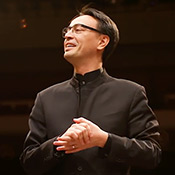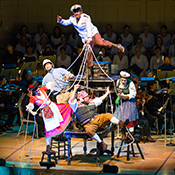
Music Director Ken-David Masur Shows Brahms’s Humor
David Lewellen
PUBLISHED
Tagged Under: 2022.23 Season, Classics
Ken-David Masur wants to show Milwaukee audiences that Johannes Brahms did have a sense of humor.
Choral works by the eminent German composer occupy the second half of the Milwaukee Symphony’s program, Every Tree Speaks: Habibi, Brahms, & Schumann, Nov. 7-9, ending with the well-known Academic Festival Overture – which up until now has not featured a chorus. But the MSO’s music director has arranged four of the tunes that Brahms employed to be sung by the Milwaukee Symphony Chorus, along with the orchestral work.
As Masur tells the story, Brahms was awarded an honorary doctorate by the University of Breslau, which asked him for a short piece to mark the occasion – and the authorities were unpleasantly surprised when Brahms produced an overture based on university students’ drinking songs. But the Academic Festival Overture has been a staple of the standard repertoire ever since.
“It’s everything but academic,” Masur said by phone last week. “We think of Brahms as this bearded old slow man, but he had an extraordinary sense of wit and humor.”
But, he says, in the past when he has conducted it, “people would tell me that the piece didn’t make sense to them,” and he wondered if it would be different with words. When he couldn’t find a pre-existing choral setting, creating his own became a project that he completed during the enforced down time of the pandemic. Publishing it later is a possibility, “if I feel like it works.”
He wrote the arrangement with the Milwaukee Symphony Chorus in mind. After last year’s Peer Gynt musical-dramatic event, he was pleased to find that “the chorus is so great in taking on roles and being part of the drama. They’ll do a great job of bringing out the nature of these songs and the humor of them.”
The best-known of the four tunes featured in the overture is the last, “Gaudeamus igitur,” which has been set for chorus before. Masur has added the other three, choosing the most interesting of the many verses and transposing them into better keys for the chorus to sing. Then the orchestra will play the original Brahms piece, joined by the chorus in “Gaudeamus igitur” for a rousing finale to the piece – and the concert.
It is quite unusual to end a program with a short work, but it will be “almost like an encore,” Masur said, after the two more serious Brahms choral works that make up the rest of the second half.
Brahms’ Schicksalslied (Song of Destiny) is performed semi-regularly, but the other piece, Gesang der Parzen (Song of the Fates), has never been performed before by the MSO or by chorus director Cheryl Frazes Hill. But, she says, “I’ve always wanted to do that piece. They’re the kind of dramatic pieces that we don’t often get to do as choral people.”
She has been working with the chorus both on the complex rhythmic and harmonic demands of the music and the underlying emotional layer. As she tells her singers, “The audience will not feel anything that you don’t feel.” And she said of Masur, who has a strong choral background of his own, “Ken-David is so expressive, he always has the emotional component that he wants the chorus to understand.”
Both pieces had been scheduled for performance in the spring of 2020, before the pandemic shut down all programming. The chorus was well along in rehearsals two and a half years ago – but coming back to it this fall, “I was surprised that we did have to rebuild it,” Frazes Hill said. “Getting back to normal is still a thing. We’re still getting our voices back, and this is a big sing to start with.”
But the chorus began working on the contrasting Academic Festival Overture only a few weeks ago. “It’s dramatic and fun,” she said. “It’s going to be a great way to end the show.”



